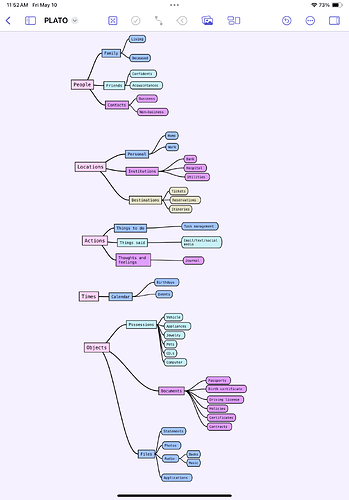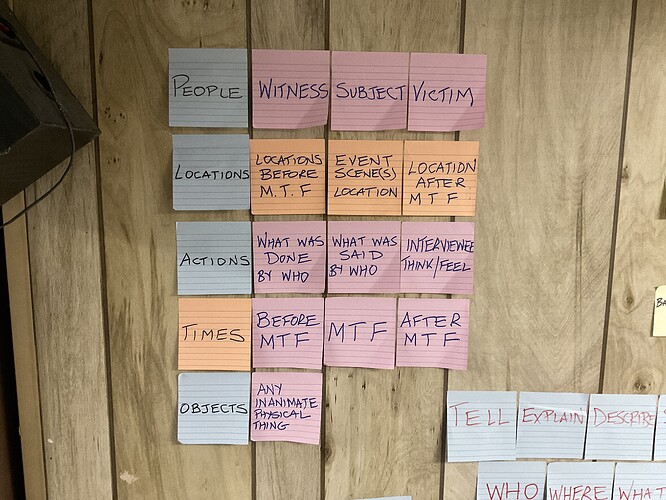This post has been prompted by Nick Milo’s - linking your thinking!.
I am on this forum as ps1816 but elsewhere I use the moniker Edmond Locard (see icon) who for those who don’t know was essentially the father of crime scene investigation with his theorem “every contact leave a trace” I am currently in the discovery phase of the online course and it struck me how relevant this is today but maybe in a different way than Locard imagined. His concept was that whenever a criminal interacted with a victim or a scene they left behind something of themselves and took away something from the other person or location, fingerprints, hair, DNA, paint - you get the picture. Now it occurred to me, whenever we interact with just about anything today we leave a digital trace or create a digital record. Much of our physical possessions are being converted to digital only, vinyl to cassettes to CD’s to files or just playlists. Receipts are emailed and most documents are downloadable. I am feeling a little overwhelmed with the tsunami of information I am considering putting in my personal knowledge library. I may well have to adopt the put 1000 things in a bucket and sort out the top 5 first method to prevent paralysis.
I am a total Apple disciple (M3 macbook, M1 Mini, Ipad, Iphone 15, Watch etc…) after a sh1ty experience with an HP laptop and use Bear notes, Apple notes, Devonthink… I have found a small app called tag spaces really useful to view and tag files right in the name and folder tidy will group 1000’s of files by their extension in seconds. I use Hazel to move tagged files to JD folders and Alfred as my search and app launcher (I see raycast mentioned a lot - is it worth switching?)
Once organised (the great thing about tomorrow is that it is always a day away!) I plan to use my personal knowledge material library to turn 40 years in the criminal justice system into a training course to pass on some of the things I have learned. JD - Any comments re creating a course and getting it out there gratefully received.
Apparently the answer is always 42 or *
Hi Edmond. I love this … I’m going to let this sit in my brain for a while.
When Lucy got to 40-49 Build your system in the workshop this is exactly what she did.
As you’ll see, we introduce category-level ‘inboxes’ that you can put stuff in for future sorting. So it’s quite a bit better sorted than it was before but it hardly requires any effort. I really like that approach.
Someone said recently, but search is failing me – was it @death.au? – that in their family they have a term ‘DOOM’: didn’t organise, only moved. So the basket of clean laundry has at least made its way near the closet, but it hasn’t been organised yet.
That’s what you can do here. DOOM it. Whoever that was hit me up here, sorry I can’t find it!
I’m considering it myself but I’m expecting it to take a bit of mental effort. I’m very familiar with Alfred and, honestly, my needs are met. Launch apps, open files, keep my clipboard, do some maths. I’m not a heavy workflow user. So I’ll move when I don’t have anything else to do.
Lucy and I went for a pre-sunrise walk this morning and we were just talking about this. We had a podcast in ~2015. That taught us how to use microphones and how to process audio. Then we made an Excel course in 2022 and that taught us how to record video and the screen and how to edit, and workflow, and so on.
So it’s bit-by-bit. If you have no experience, I’d suggest buying a microphone to start. Hey, maybe start a podcast? Probably nobody will listen to it – nobody listened to ours! – but that doesn’t matter. (I promise I’ll listen to it.) You’re doing it to learn.
I think there’s an interesting analogy to baking bread. I just took a sourdough baguette out of the oven. It’s my own sourdough starter which I made in to a dough on Wednesday and baked this morning. This loaf took about 15 minutes of effort, and theoretically I could write down how to do it.
None of the steps are difficult. They all feel really obvious to me now. But the first few months’ of bread I made were pretty crap. Why? It’s that internal knowledge. The feel of the thing. You just know when it feels right. And that’s something you can’t write down. You just have to mess up 20 loaves and pay attention and want to keep doing it.
That said, the ‘easy’ part is recording a course. The hard part is having anyone find out about it…
Yeah, it was me. It was in the workshop class thread, which is likely hidden from search.
:shakes fist at sky:
Thank you sir!
I am potentially lucky in respect of having a base of people for a investigation course as I currently have a side hustle of teaching an interview framework to various agencies in the US (Police and Federal) www.fis-international.com . The framework is known as P.E.A.C.E. and in another linking thinking moment it has some utility in how to approach project management or the JD course.
P is for planning and preparation. We created a scope in 10-19. For interviewing we suggest in planning and prep that we create for each interview an aim (goal) and objectives.
E is for Engage and Explain, which is really just communicate with the person and explain what the process of an interview will look like and what each step will be, seems similar to knowing what your system will look like and the steps to build it.
A is for Account where questions of a specific type and form (designed to be memory compatible) are asked to obtain and elicit information in various topic areas. This mimics your discovery of information and the characterization into areas and categories.
C is for clarify (or challenge) seems pertinent where things fit into more than one area and a decision needs to be made.
E is for Evaluate - What did you achieve, what can be done better etc…
Now comes the part that may be a stretch. We teach there are only 5 topic areas required to cover all the information to be acquired in an interview, [PLATO -
P for People, L for Locations, A for Actions (and verbal statements), T for Times and O for physical Objects.]
Random thought - Can these topic areas form the basis for a general JD system? What about a JD system just to teach this framework or even create a instructional course…firing up mind map software!


